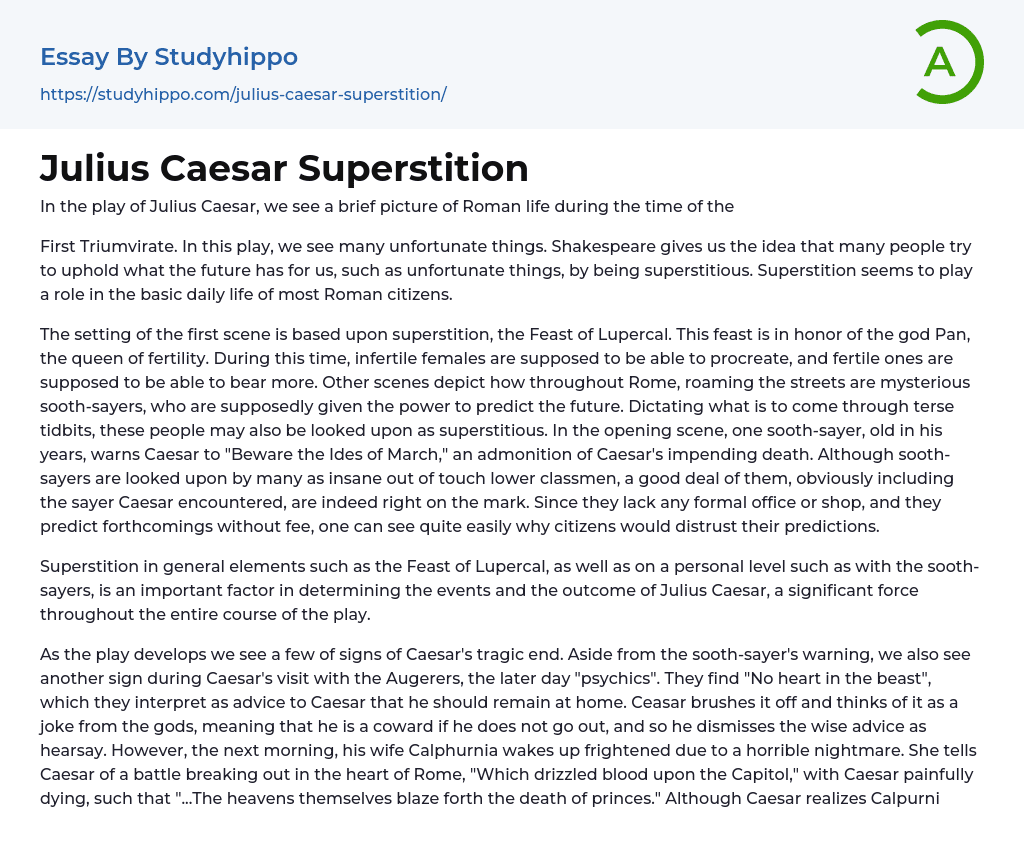In the play Julius Caesar, Roman life during the time of the First Triumvirate is briefly depicted. Unfortunate events are highlighted by Shakespeare, suggesting that many people resort to superstition to navigate the uncertainties of the future. Superstition appears to be a common aspect of daily life for most Roman citizens. The setting of the first scene revolves around the Feast of Lupercal, a superstitious celebration in honor of the fertility god Pan and the fertility queen. It is believed that during this feast, infertile women can conceive and fertile ones can bear more children. Another depiction in the play shows mysterious soothsayers roaming the streets of Rome, possessing the power to predict the future. These soothsayers are seen as superstitious and are known for predicting what lies ahead through brief and cryptic messages. In the open
...ing scene, an elderly soothsayer warns Caesar about the impending danger of the Ides of March, foretelling his death. While many view soothsayers as insane or disconnected from reality due to their lower social status, some, including the one Caesar encounters, turn out to be accurate in their predictions. Since they do not hold any formal positions or charge fees for their predictions, it is understandable why citizens may be hesitant about trusting them.The role of superstition, both on a general level and on a personal level, is a significant factor in determining the events and outcome of Julius Caesar. Throughout the play, superstition and its various elements, such as the Feast of Lupercal and the sooth-sayers, play a crucial role. As the play progresses, several signs foreshadow Caesar's tragic end. In addition to the warning from the sooth-sayer,
another sign is witnessed during Caesar's meeting with the Augerers, who can be thought of as "psychics" of their time. They find that there is "No heart in the beast", which they interpret as an advice for Caesar to stay at home. However, Caesar brushes off this advice, thinking it to be a joke from the gods and dismissing it as hearsay. However, the next morning, his wife Calphurnia wakes up frightened after having a terrible nightmare. She informs Caesar about a battle taking place in the heart of Rome, resulting in blood spilling onto the Capitol and Caesar's painful death. This vivid nightmare is seen as a celestial omen indicating the death of rulers. While Caesar acknowledges Calpurnia's genuine concern for his well-being, he seeks an alternative interpretation, believing that the person dreaming the dream may not be the wisest in interpreting its meaning.Later, Caesar informs Decius about the vision he saw. Decius interprets it differently, believing it to be a positive and fortunate vision. He suggests that today is an auspicious day for Caesar, a day where he will receive praise and admiration rather than face any danger, as Calpurnia had feared. Caesar agrees with Decius, as most people prefer to believe in the more optimistic interpretation. After Caesar is assassinated by Brutus, Cassius, and the other conspirators, Brutus and Cassius flee to the countryside. There, they witness several superstitious signs indicating their upcoming defeat in battle. In a dream, Brutus sees Caesar's ghost, which he takes as an omen of his own defeat. He also notices that the usual eagles on the ensign are replaced by ravens and kites, which he believes
to be another sign of their loss at Phillipi. Unsurprisingly, Caesar's death is eventually avenged through the double suicide of the two conspirators. The play highlights the presence of superstition throughout and suggests that irrational beliefs about the causes of events and how to avoid them ultimately lead to Caesar's downfall and subsequent revenge.Mark Antony, a loyal supporter and friend of Caesar, described him as a gentle soul. He believed that Caesar possessed such a unique combination of qualities that even Nature itself would acknowledge him as a remarkable man.
- Ancient Rome essays
- Augustus essays
- Byzantine Empire essays
- Julius Caesar essays
- Mark Antony essays
- Roman Republic essays
- Activity essays
- Believe essays
- Comfort Zone essays
- Dance essays
- Fashion essays
- Fishing essays
- Fitness essays
- Freedom essays
- Habits essays
- Healthy Lifestyle essays
- Hobby essays
- Hunting essays
- Interests essays
- Justification essays
- Moment essays
- Optimism essays
- Peace essays
- Perfume essays
- Shoes essays
- Shopping essays
- Silence essays
- Superstition essays
- Survival essays
- Vegetarianism essays
- Welfare essays
- Worldview essays




